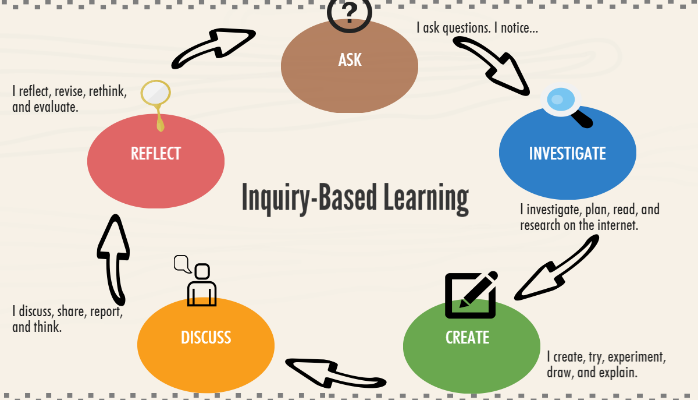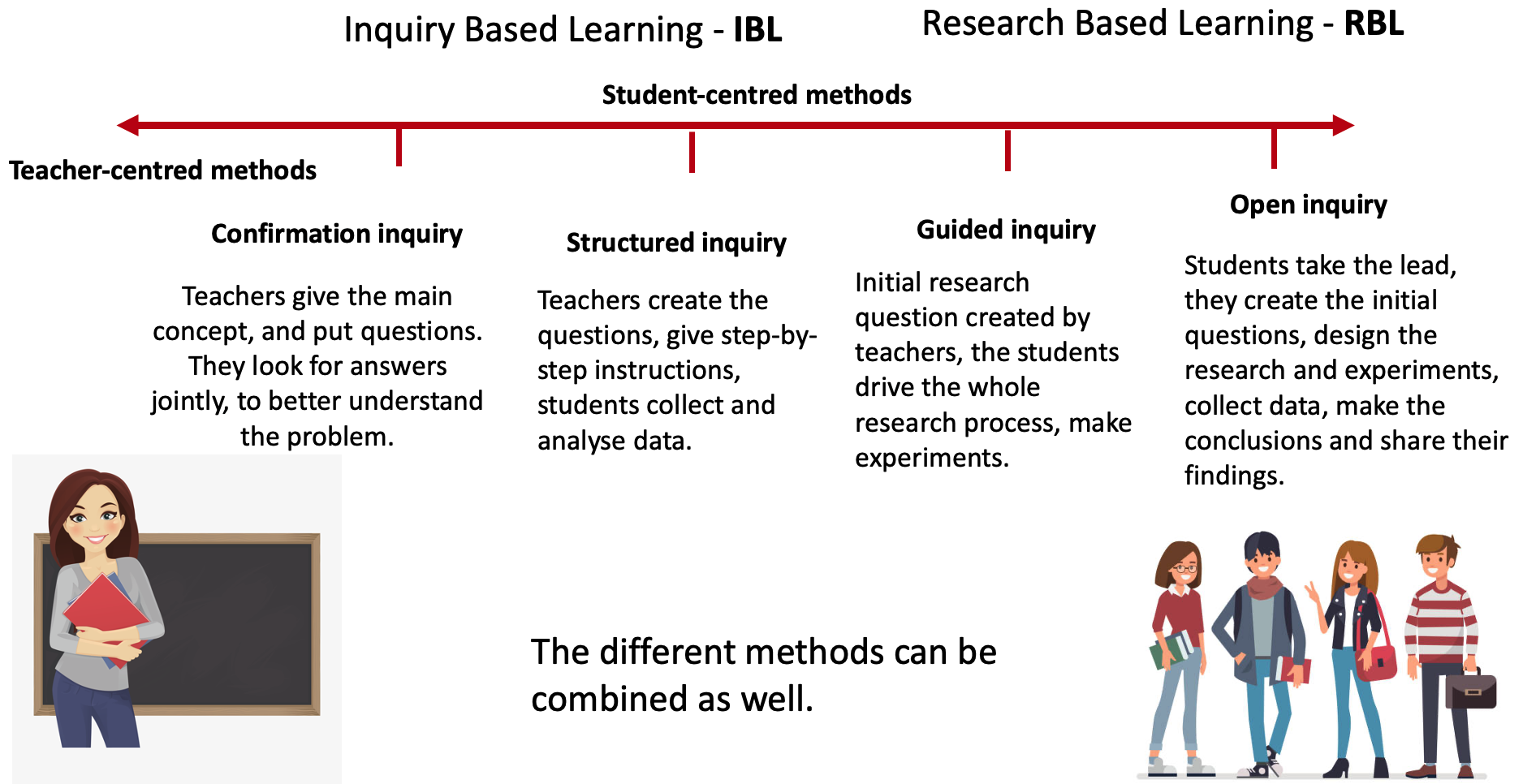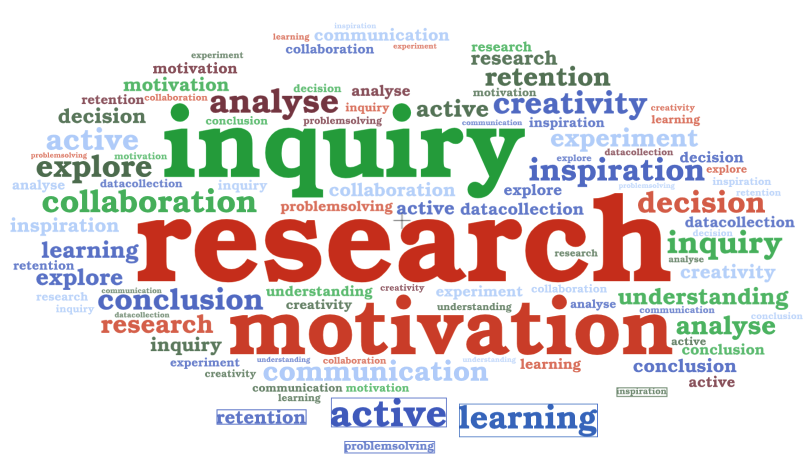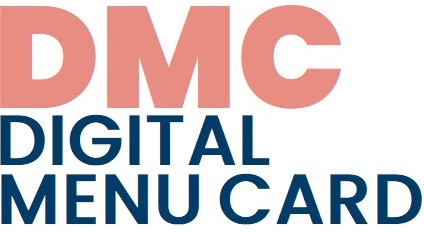Discovery-based, inquiry-based learning is a learner-centred approach to solving real-life problems with the active participation of learners. With the help of teachers, students work with their peers to experiment, investigate, model processes and actively and creatively address issues in the subject area.

Source: https://www.tes.com/
The method is referred to by two different names in the literature, depending on the extent to which the teacher is involved in the preparation and implementation of the research and the autonomy with which the students can work:
Inquiry Based Learning (IBL)
Research Based Learning (RBL)
Both approaches are learner-centred, with the active participation of the learners, but while in inquiry learning the teacher asks the initiating questions, he/she guides the experiments (discovery) and the drawing of conclusions, in research-based learning the students are given more autonomy, independency and the learning process are closer to the steps of scientific research (problem definition, initial questions, formulating hypotheses, conducting experiments, carrying out investigations, collecting and analysing data, drawing conclusions).

The phases of the work are the same in each solution, the difference is in the role of the teachers and the level of autonomy of the students.
- Orientation, orientation - choosing the topic, discussing the problem
- Formulating the research concept - gathering information, initial questions, hypotheses, designing experiments, research methods
- Conducting experiments, studies - data collection, data analysis
- Conclusion - evaluation, formulation of results
- Sharing results - publish the results with wider audience (peers, parents, teachers)
Pupils learn about scientific research methods, learn to identify and describe real problems, learn to formulate hypotheses and questions, and then to answer these questions using research methods.

Additional benefits:
-
Research is geared towards investigating and solving real-life problems, which inspires learners, increases motivation, responsibility for learning and promotes understanding.
-
Students are active participants and experience a sense of achievement through experimentation and investigation.
-
The topic selected by the students will be built on their prior knowledge.
-
It promotes a better understanding of the subject matter, critical thinking and gives students the opportunity for self-reflection;
-
Cooperation improves their social and communication skills.
-
The teacher can better assess the level of knowledge and skills of students, and recognise their typical errors.
The use of these methods always requires considerable preparation from the teacher, regardless of which end of the previous diagram, exploratory or complex inquiry-based, is closer. He or she must plan the task very precisely and develop precise criteria for evaluation.
The other issue, and difficulty, is the integration of time-consuming research into the curriculum. The essence of research activities is flexibility and dynamism, which is difficult to reconcile with a fixed curriculum.
One of the key challenges is to base the exploratory or research-based work on a real-life problem that excites students. With a textbook-flavoured, unchallenging, pre-solved problem, the motivation to explore and research is dramatically reduced.
Lastly, most research requires an interdisciplinary approach, which means that research activities are most effective when carried out in collaboration with teachers of different subjects, which can also cause organisational difficulties.
Despite the fact that the method itself goes back thousands of years (since Socrates himself used questions to help his students understand the "subject matter"), its application is still an innovation compared to traditional knowledge transfering teaching. And, like all innovations, it bears the difficulties of leaving the "beaten track", although it offers real pedagogical success for both the learner and the teacher.
Discovery and inquiry-based learning is a broad concept, encompassing several learning methods, which are characterised by the following common elements:
- exploring real questions, problems, along initial, problem-oriented questions,
- developing higher-order thinking skills and metacognitive skills,
- working with peers, self-organisation, division of roles, groupwork to find solutions to complex problems.
IBL and RBL are active learning methods, the first step of which is to arouse the curiosity of the learners. In the background is the age-old experience: the pupils are interested in everything, always asking questions. The innovative teacher is able to awaken this "wanting to know" through the inquiry-based method.
In case of research that requires more autonomy, one of the biggest challenges will be the organisation of the group, the appointment of leaders and group dynamics. Some students have no experience of goal-oriented self-organisation and democratic teamwork.
“Another key element of inquiry-based learning is questioning. In a language lesson, the language teacher may not get the right answer from the students. One possible reason for this is that the questions are not tailored to the language level of the students, the questions cannot be answered in a variety of ways, or they are not challenging for the students. That’s why it’s important what questions we ask students and in what order, as this will have a big impact on the success of the discovery process. ” (English teacher)
“I really liked that we were able to choose the topic we were working on. So we were able to discover something that interested us. Through the form of discovery, I got a lot more than I had expected. I enjoyed it much more than I had thought before.” (Students)
